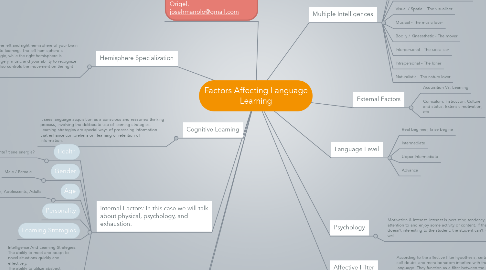Factors Affecting Language Learning
создатель Manolo Origel

1. Internal Factors: In this case we will talk about physical, psychology, and exhaustion.
1.1. Health
1.1.1. Ya comió tu estudiante? tiene energía?
1.2. Gender
1.2.1. Male / Female
1.3. Age
1.3.1. Children, Adolescents, Adults
1.4. Personality
1.5. Learning Strategies
1.6. Intelligence And Learning Strategies: The ability to meet and adapt to novel situations quickly and effectively. The ability to utilize abstract concepts effectively. The ability to grasp relationship and to learn quickly.
2. Aptitude is the capacity to learn. Everyone have different aptitude. So, its time for us to use that aptitude maximally for our best. The good way is to use the aptitude by study and practice as much as we can do.
3. Learning Strategies
3.1. “Specifications, behaviors, steps, or techniques, such as seeking out conversation partners, or giving oneself encouragement to tackle a difficult language task, used by students to enhance their own learning"
3.2. 6 groups: cognitive, metacognitive, memory-related, compensatory, affective, and social.
4. Cognitive Learning
4.1. It sees language acquisition as a conscious and reasoned thinking process, involving the deliberate use of learning strategies. Learning strategies are special ways of processing information that enhance comprehension, learning or retention of information.
5. Hemisphere Specialization
5.1. Scientists have long held the theory that the left and right hemisphere of your brain control different functions when it comes to learning. The left hemisphere is thought to control language, math and logic, while the right hemisphere is responsible for spatial abilities, visual imagery, music and your ability to recognize faces. The left hemisphere of your brain also controls the movement on the right side of your body.
6. Done by José Manuel Romero Origel. [email protected]
7. Psychology
7.1. Motivation & Interest. Interest is persisting tendency to pay attention to and enjoy some activity or content. If the lesson doesn't interesting to the student, the student can’t learn well.
8. Language Level
8.1. Real beginner, false begine
8.2. Intermediate
8.3. Upper Intermediate
8.4. Advance
9. Affective Filter
9.1. According to the affective filter hypothesis, certain emotions, such as anxiety, self-doubt, and mere boredom interfere with the process of acquiring a second language. They function as a filter between the speaker and the listener that reduces the amount of language input the listener is able to understand. These negative emotions prevent efficient processing of the language input.
10. Multiple Intelligences
10.1. A theory of intelligence that differentiates it into specific (primarily sensory) "modalities", rather than seeing intelligence as dominated by a single general ability.
10.2. Linguistic - The word player
10.3. Logical / Mathematical - The questioner
10.4. Visual / Spatial - The visualiser
10.5. Musical - The music lover
10.6. Bodily / Kinaesthetic - The mover
10.7. Interpersonal - The socialiser
10.8. Intrapersonal - The loner
10.9. Naturalistic - The nature lover
11. External Factors
11.1. Acquisition Vs. Learning
11.2. Curriculum, Instruction, Culture and status, Extrinsic motivation, etc.



